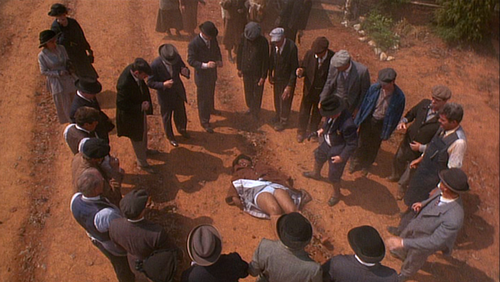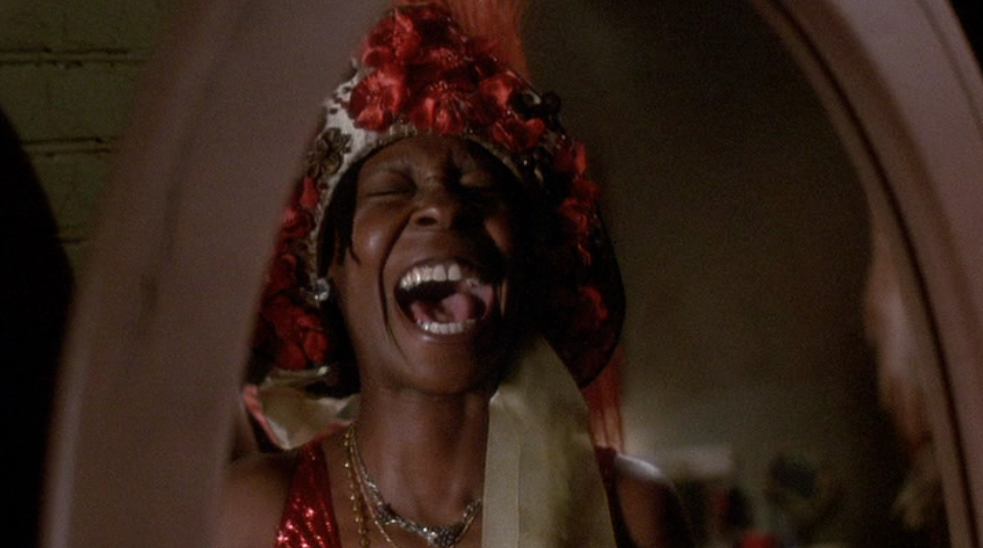When I selected The Color Purple (1985) for the Best Shot series I was motivated not only by recent conversations about Oprah Winfrey's big screen return and dim memories of her debut as Sofia but by my own remembered shrug towards the movie. For such a widely beloved movie it's not one I ever warmed to -- though I remember loving the "Miss Celie's Blues" scene -- which turned to be the magnet for our Best Shot club. I knew it was time to revisit since how can you ever warm to something you're never in contact with? I hadn't watched the film since I was sitting in the movie theater in 1985 as a newborn Oscar fanatic (!) if you can believe it.
 my favorite of the movie's self-consciously beautiful moments
my favorite of the movie's self-consciously beautiful moments
1985 was a crucial year in my Oscar fanaticism. It was the first year in which I consciously remember reading about movies through a golden statue lens and wondering about what might get nominated months in advance. This hardly seems worth noting except that this was unusual at the time. That's something that people do much more loudly now -- like 10,000 times more loudly -- than they ever did publicly before, say, the early mid 90s when the sea change began (brought on by both the rise of campaign-crazy Miramax and the Internet). By the late 90s Oscar had fully become the long seasonal circus we recognize today as opposed to a One Night Only event that people talked about for one month of the year. It seems like such an innocent time actually -- the only articles about Oscar were in monthly or weekly entertainment magazines until basically the week of the ceremony when things got loud. At least that's the way I remember it.
I bring up the Oscars primarily as a window to personal history and how my opinion has both changed and stayed the same. [more]
I still don't love The Color Purple. The repeated use of outright slapstick to lighten the mood is outrageously tone-deaf to the depth of the misery experienced by Celie (rather than balancing salve, since the non-slapstick humor is more than enough) and throws an unflattering light both on Spielberg's audience hand-holding (usually a negative) and his dynamic framing (usually a positive), making the latter feel more cartoon-like than any version of this story not called Disney's The Color Purple should. The movie is beautifully lit by Allen Daviau but in some ways I find it easier to choose my worst shot than my best. Since that pandering eye and the cartoon framing really trouble me.
Witness:


But today I do like The Color Purple much more than I did and wish I liked it more than that still though I think that would require a remake from a more nuanced directorial eye and ear (removing the sentimental and constant musical score would help immeasurably) though good luck besting the Whoopi-Margaret-Oprah trinity. That might be too tall a task.
All of which is my way of saying that my choice for Best Shot is not so much a definitive shot from the movie -- none of the key actresses are present -- but the one that took me most by surprise with its sideways potency. It's the shot that suggested a thousand other movies about women of color and their hard road, movies taking place concurrently alongside this one and some of them, sadly, running still.
 best shot
best shot
Weddings should be happy events. In this sequence early in the film, Nettie and Celie are not yet separated and their father remarries a bride their age. She turns and looks at her new step-daughters while they whisper and giggle. Her expression is ambiguous enough to allow you to fill it. With fear. With sadness. With resignation. With disguised anger... with any story you could imagine (except a happy one). Her story would be readily understood by Celie and Nettie should their sealed sibling bond open long enough for them to really look at her, and let another sister in.
This moment presages a lot of what I didn't understand in 1985 but which the movie will focus on and concern itself with. The way in which the oppressed look at and to each other with fear, confusion, guilt, shared misery, and even hope in their most daring moments. But will they meet another oppressor?
Celie's first meeting with Shug is cruel...
You sure is ugly!"
And Celie herself famously aids in the crushing of Sofia's spirit... which makes her triumphant curse on "Mister" painfully compromised with history.
Everything you done to me, already done to you."
When these women dare to really look at each other they can also meet a kind gaze and find a new kind of "Sister"
 my favorite sequence, just masterfully composed and resonant
my favorite sequence, just masterfully composed and resonant
Frankly watching it again I experienced a moment of what one might call White Liberal Guilt. I grew up 5 minutes from the Detroit border and my childhood was unofficially segregated -- my graduating class in high school had 300+ students and I personally only knew one student who wasn't white. I also wasn't fully cognizant of my own status as an LGBT person so the uproar over Spielberg's coyness didn't register strongly though Shug's singing to Whoopi was (and still is) my favorite piece of the movie. In fact, I love the whole scene both before it and after it at the Juke Joint -- by far the longest stretch in the movie where everything works... even (sigh) the slapstick with Harpo falling from the rafters.
I worry now that my young self was just completely naive about the outrageous and enduring systematic injustices of both racism and sexism. How did I not thrill to Whoopi Goldberg's lead performance, for example, which is nuanced, measured, brave, multi-tonal and uniquely beautiful? I remembered it somehow as amateurishly awkward as Celie moved from meekness to strength but this is not at all how it plays as an adult, with Whoopi taking the necessary baby steps to show Celie's very slow growth which leads to her finally standing up for herself and strong against Mister. In a way this newfound strength -- it is a character leap -- is brilliantly exposed as who Celie always would have been, had the world been kinder to her. How did I not cry for Sofia's (Oprah Winfrey) vivacious proud spirit being crushed? How did Shug's desperate need to be loved by her father not move me more?
I'm glad I grew up. I'm happy to re-absorbed the story with wiser more compassionate eyes and for the first time I'm desperate to read the book and discover what so many claim Spielberg missed in this uneven, compromised but powerful film version.
 my favorite of Celie, laughing so hard it looks like she's wailing in anguish
my favorite of Celie, laughing so hard it looks like she's wailing in anguish
If you've seen The Color Purple recently did your opinion change?
To circle back to Oscar history, which of its 11 nominations would you have gladly seen it win? (At the time I was fine with none and I think most people today wrongly remember how stacked with wonders the 1985 Oscars were in a lot of categories but today in 2013 I am kind of outraged that it didn't win these two statuettes: "Best Song" and "Best Makeup". And I finally understand why so many people wanted it to win "Best Actress" (though it would have been horrible to see acting legend Geraldine Page go to her grave Oscarless.)
see all the shots chosen and read the great articles from participating blogs